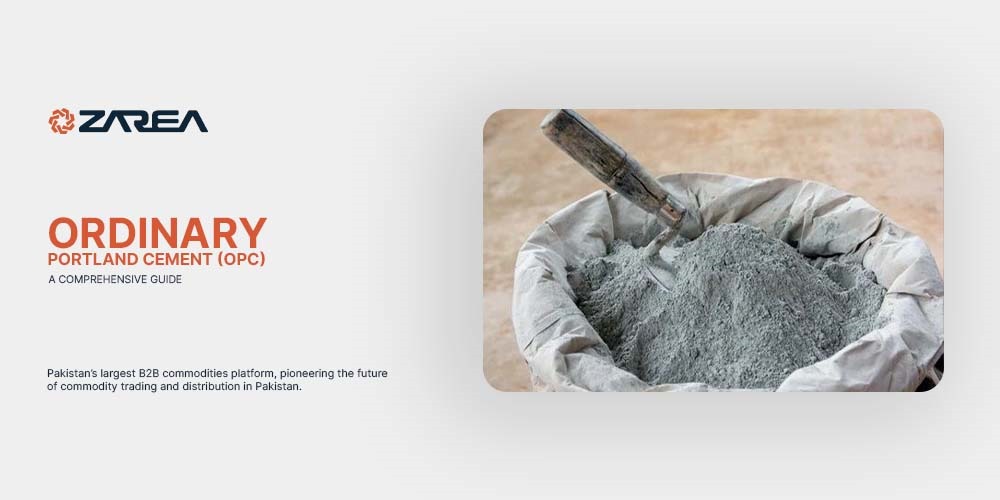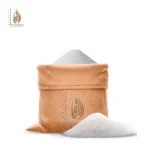Introduction – OPC:
Ordinary Portland Cement (OPC) is among the most frequently utilized construction materials globally. Various construction projects might necessitate different kinds of Portland cement. The three primary types of Portland cement are Ordinary Portland Cement (OPC), Portland Pozzolana Cement (PPC), and Portland Slag Cement (PSC). OPC is a type of hydraulic cement composed of Portland cement clinker and gypsum. OPC is utilized in nearly all types of general construction.
It acts as the main adhesive in concrete, mortar, and plaster, rendering it a crucial element in building. Recognized for its robustness, longevity, and adaptability, OPC is utilized in residential, commercial, and infrastructure developments. This thorough guide investigates the structure, varieties, production process, uses, benefits, and drawbacks of OPC.
Want To Buy 53 Grade OPC? Click Here
Composition of Ordinary Portland Cement (OPC):
OPC consists of four main components:
- Lime (CaO): Calcium Oxide sourced from limestone or chalk constitutes a larger part of the cement’s makeup. Limestone and chalk are both forms of calcium carbonate. Improves strength and setting characteristics.
- Silica (SiO₂): Sourced from sand or clay, silica is the second most prevalent chemical in cement. In the production of cement, silica interacts with calcium to create di-calcium and tri-calcium silicates. Enhances the cement’s strength and sturdiness.
- Alumina (Al₂O₃): Aluminum oxide is derived from clay and shale and aids in speeding up the hydration reactions. Enhances durability against elevated temperatures.
- Iron Oxide (Fe₂O₃): Iron ore-derived iron oxide is advantageous for creating cements with significant early strength. Improves the strength and hue of cement.
- Gypsum (CaSO₄·2H₂O): Gypsum is included in cement to aid in regulating the setting time.
Extra materials like gypsum are incorporated to regulate the setting time of the cement.
Different Grades and Types of OPC:
- OPC 33 grade: This classification offers a minimum compressive strength of 33 MPa. It is appropriate for non-structural uses such as plastering, flooring, and general building tasks.
- OPC 43 grade: Featuring a minimum strength of 43 MPa, this grade is commonly utilized for various construction projects, such as residential and commercial structures.
- OPC 53 grade: This durable grade ensures a minimum compressive strength of 53 MPa, making it ideal for essential structural uses like bridges, skyscrapers, and infrastructure developments.
Types of OPC cement:
- Ordinary Portland cement (OPC): This standard, grey cement is perfect for various construction uses.
- Rapid hardening OPC (RHPC): This variant hardens and sets more swiftly than regular OPC, making it ideal for repair and construction tasks that need quick curing.
- Sulphate-resistant OPC (SRC): Created to withstand the harmful impacts of sulphate exposure, this variant is utilized in regions with elevated sulphate levels in soil or water.
Manufacturing Process of OPC:
The subsequent outline details the production process for Ordinary Portland Cement:
Raw Materials Source
Raw materials such as limestone and clay are extracted from rock quarries through the use of explosives. The unprocessed material is subsequently delivered to grinding facilities.
Milling Limestone and Clay
Different kinds of grinders process the limestone and clay into smaller particles to create a uniform mix.
Warm the Blend
The uniform mixture of raw materials is elevated to high temperatures in a kiln. The producer might include extra components depending on the kind of cement. The intense blend creates clinker.
Clinker Cooling
The clinker is quickly cooled to ensure its chemical properties are stable.
Crush Clinker
Clinker is finely ground together with gypsum to produce Ordinary Portland Cement.
Packaging and Distribution
The completed cement is bagged and delivered for use.
Applications of Ordinary Portland Cement:
- Building construction: OPC cement is a flexible substance commonly used in the development of residential, commercial, and industrial structures. It serves to construct walls, floors, and roofs, ensuring stability and longevity for the whole structure.
- Infrastructure initiatives: Major infrastructure initiatives, such as roads, bridges, tunnels, and rail tracks, greatly depend on OPC cement. Its robustness and longevity guarantee the secure and enduring functioning of these essential facilities.
- Precast concrete items: The versatility of OPC cement renders it appropriate for manufacturing precast concrete items like pipes, pavers, blocks, and railway sleepers. These items are utilized in diverse construction contexts, promoting economical and effective building methods.
- Concrete manufacturing: Serves as the foundation of structures, overpasses, and highways.
- Plastering and masonry: Ensures a smooth finish and strong adhesion.
Advantages of OPC:
- Outstanding compressive strength: OPC cement is well-known for its remarkable compressive strength. It offers the capability to endure significant loads and oppose external forces, making it a perfect selection for construction where structural integrity is essential. This strength is essential for building load-supporting structures such as foundations, columns, and beams.
- Durable constructions: The characteristics of OPC cement guarantee that buildings made with it will endure over time. It shows resilience to wear and tear, making it ideal for projects that require durability, like bridges, dams, and industrial plants. This resilience decreases the necessity for regular upkeep and fixes.
- Fast setting time: Shortens building duration.
- Flexible uses: Ideal for various building requirements.
Limitations of Ordinary Portland Cement:
- High carbon footprint: Considerable CO₂ emissions in the manufacturing process.
- Fragile characteristics: Needs support in high-stress scenarios.
- Water sensitivity: Vulnerable to fractures if not adequately cured.
Cost-effectiveness and Compatibility of OPC:
- Cost-effectiveness in relation to other cement types: OPC cement provides a compromise between quality and cost, rendering it an accessible option for various construction projects.
- Cost-effectiveness in construction projects: The exceptional strength and durability of OPC cement offer value for money, as it minimizes the necessity for regular repairs and replacements, ultimately leading to savings in construction expenses over time.
Suitability with different building materials:
Versatile with various aggregates and additives: OPC cement can be customized to meet particular construction requirements by modifying the mix with different aggregates and additives. This flexibility facilitates customisation, permitting the development of concrete with preferred characteristics like improved workability, quicker curing durations, or greater resistance to environmental elements.
Final Concluding Thoughts:
Ordinary Portland Cement (OPC) continues to be a crucial material in building because of its durability, dependability, and versatility. Despite its ecological disadvantages, continuous advancements in cement production seek to lower its carbon emissions. Grasping the characteristics and uses of OPC enables engineers, builders, and consumers to make knowledgeable choices for sustainable and efficient construction initiatives.
FAQ’s:
What is the ordinary Portland cement?
Ordinary Portland cement (commonly known as ordinary cement) is a hydraulic binding substance produced by grinding a mixture of Portland cement clinker, 6% to 15% of blended materials, and a suitable quantity of gypsum.
In brief, Ordinary Portland Cement (OPC) is a variety of Portland cement that combines with water and aggregates to create concrete, mortar, or plaster. Additional materials such as pozzolana and slag are mixed with OPC to create blended cements.
What is OPC cement used for?
It is utilized for pavements and walkways, sturdy concrete structures, bridges, railway systems, tanks, reservoirs, culverts, sewage systems, water lines, and masonry blocks.
What are the advantages of ordinary Portland cement?
OPC and its different grades can be utilized for nearly all kinds of building projects. Its minimal alkali content offers enhanced defense against alkali-aggregate reactions. It has excellent resistance to sulfate attacks, making it perfect for marine structures.
Is OPC cement waterproof?
OPC, one of the most widely utilized cements worldwide, is a hydraulic cement that gains water resistance once it has been cured with water. It is produced by grinding gypsum and clinker together.
Which type of cement is best?
For projects requiring high strength, 53-grade cement is the optimal choice. Cement Durability: 53 N/mm². Cement Use: It is particularly suited for skyscrapers, dams, and robust constructions.
































